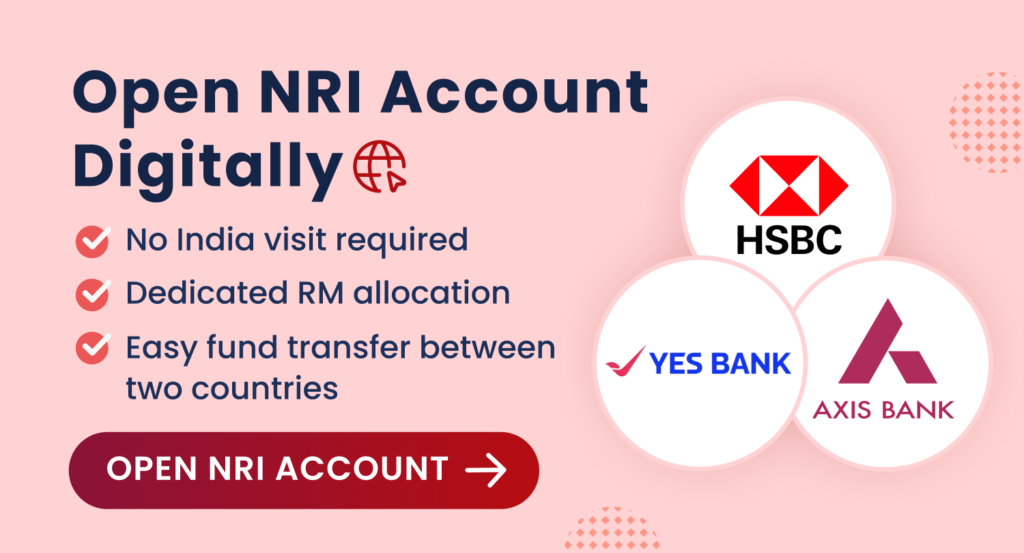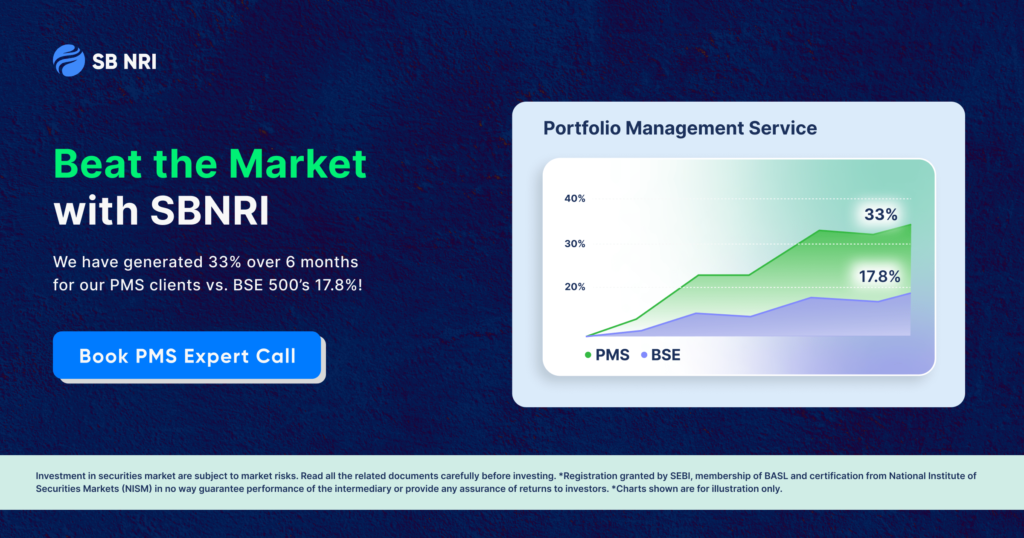
For Non-Resident Indians (NRIs) and Overseas Citizens of India (OCIs) living in Australia, investing in their home country can be a smart financial move. India offers a range of NRI investment options, from stocks and bonds to real estate and mutual funds. In this blog, we will explore top 5 investment options in India for NRIs from Australia. Whether you are a seasoned investor or just starting out, this blog will help you make informed decisions about your investments in India.
Investment Options in India for NRIs from Australia
Given below are the top 5 investment options in India for NRIs from Australia:
1. NRI Mutual Funds
What is NRI Mutual Fund?
NRI Mutual funds are investment vehicles that pool money from a large number of investors and invest that money in a diversified portfolio of stocks, bonds, money market instruments, and other securities. The pooled money is managed by professional fund managers. They invest the money on behalf of the investors per the investment objectives of the mutual fund.
Also read: Best Mutual Funds for NRI in India 2024
Benefits of NRI Mutual Fund Investment
NRIs in Australia may consider investing in mutual funds in India for several reasons:
- Mutual funds provide NRIs with a diversified portfolio of investments across various asset classes, including equity, debt, and money market instruments. This helps spread the investment risk across different securities, reducing the impact of volatility on the overall investment portfolio.
- Mutual funds are managed by professional fund managers who have the expertise to select and manage securities in the portfolio. This allows NRIs to benefit from the experience of investment professionals who analyze the markets and make informed investment decisions.
- NRIs can easily invest in mutual funds in India through online investment platforms or with the help of financial advisors. This makes it easy for them to manage their investments from anywhere in the world.
- NRIs investing in mutual funds in India can avail of tax benefits under the DTAA (Double Taxation Avoidance Agreement) between India and Australia. This can help NRIs reduce their tax liability in one of the countries.
- There are multiple mutual funds for NRIs in Australia to invest in India. They can choose to invest in any of them depending on their investment goals and risk tolerance.
- Mutual funds are a good long-term investment option, and can provide NRIs with the opportunity to grow their wealth over time.
Also read: 10 Mutual Funds That Doubled Wealth In 5 Years

Investment Procedure to Invest in Mutual Funds in India
Australia-based NRIs can invest in mutual funds by opening an NRO account, an NRE account, or an FCNR account with an Indian bank. They can invest by any of the methods given below:
a. Direct Method
When submitting your mutual fund application, NRIs must ensure that it includes the necessary KYC details and documents. The fund house may also require an in-person verification, which can be done by visiting the Indian Embassy in your country of residence.
b. Power of Attorney
A commonly used alternative is to delegate investment responsibility to a third party. By appointing a Power of Attorney (PoA) holder, who is authorized to make investment decisions on your behalf, you can invest in mutual funds through them. However, the KYC documents must feature the signatures of both the NRI investor and the PoA holder if you intend to invest in mutual funds in India.
Also read: Best SIP to Invest in 2024 – Top 10 SIP Mutual Fund Plans for NRIs/OCIs

2. Stocks
What are Stocks?
A stock, a type of security, represents an ownership share in a company. Investors buy stocks with the expectation that their value will increase over time. By purchasing a company’s stock, an investor acquires a portion of ownership in that company. NRIs living in Australia can invest in Indian stocks through PIS (Portfolio Investment Scheme) of the RBI on a repatriable basis or through Non-PIS on a non-repatriable basis.
Benefits of NRI Investment in Stocks in India
Here are some of the benefits of NRI investment in stocks:
- Stocks have the potential to provide high returns over the long term, which can help Australia-based NRI investors build wealth and meet their financial goals.
- Investing in a variety of stocks can help diversify an investor’s portfolio, reducing the overall risk of loss.
- The Indian stock market has delivered attractive returns over the long term. Therefore, NRIs from Australia can earn higher returns from investing in stocks as compared to traditional investment options such as fixed deposits and bonds.
- NRI investors can start investing in Indian stocks with a relatively small amount of money, making it accessible to a wider range of investors.
- The Indian stock market is regulated by the Securities and Exchange Board of India (SEBI), which provides a level of protection for investors.
Investment Procedure to Invest in Stocks in India

NRIs in Australia can invest in stocks in India through the following ways:
- NRIs can also invest in Indian stocks through the Portfolio Investment Scheme (PIS). Under PIS, NRIs can invest in Indian equities and buy and sell shares and debentures of Indian companies on a recognized stock exchange. NRIs must open a PIS account with a designated bank and link it to their NRE/NRO account. Opening a PIS account is possible at designated branches of all major banks in India.
- NRIs can use a Non-PIS account to buy/sell equity shares, mutual funds, and IPOs of an Indian company on a non-repatriation basis. NRIs must link their NRE/NRO bank account with the Demat account. They can then transfer funds from their NRE/NRO account to the Demat account and once the funds are transferred to the Demat account, NRIs can place orders for buying and selling stocks on Indian stock exchanges.
- They can also invest in Indian stocks through mutual funds. Several mutual funds in India invest in stocks, and NRIs can invest a lump sum amount or through SIP.
Also read: PMS for NRI: A Comprehensive Overview
Disclaimer: SBNRI is a distributor of portfolio management services offered by SEBI registered portfolio managers. SBNRI is facilitating your investment and any assistance provided by SBNRI shall not be considered as advice/ recommendation. SBNRI does not intend to predict the success of the strategies. You are advised to read related documents and independently determine its suitability to your goals & investment objectives.

3. NRI Bonds
What are NRI Bonds?
NRI bonds are government securities in the form of bonds issued by the RBI to NRIs who want to invest their money in the country.
Benefits of Investment in NRI Bonds in India
Given below are the benefits of NRI investment in bonds –
- There are different types of bonds like Non-Convertible Debentures (NCDs), Public Sector Unit (PSU) and Capital Bonds, Government Tax-free NRI Bonds, etc that NRIs can consider investing in.
- Investing in government securities is very convenient for NRIs in terms of tenure periods as it ranges from as low as 3 months to 41 years.
- Government-backed NRI bonds are considered low-risk investments as they are guaranteed by the Indian government. They offer a stable source of income and provide a sense of security to investors.
- NRI bonds provide an easy and hassle-free way to repatriate funds to the investor’s country of residence. This can be useful for NRIs who want to move their money outside India or need to fund their overseas expenses.
- Investing in NRI bonds can provide diversification to an NRI’s investment portfolio, which can help in reducing overall portfolio risk.
Also read: Best Monthly Interest Paying Bonds for NRIs
4. Commercial Real Estate
What is Commercial Real Estate?
Commercial real estate refers to non-residential properties that are used for generating revenue through business operations. It includes various types of properties, such as office buildings, duplex homes, restaurants, and warehouses. Over 52 percent of NRIs looking to invest in commercial real estate properties as a means of portfolio diversification and long-term wealth generation. NRIs can earn income from commercial real estate by leasing or renting out these properties. Investing in commercial real estate in India can be a good way for NRIs living in Australia to diversify their investment portfolio and earn good returns.
Benefits of Investing in Commercial Real Estate in India
Given below are some of the reasons to invest in CRE in India:
- Commercial real estate in India has the potential to generate higher rental yields compared to residential properties. This can provide a stable source of income to NRIs who invest in commercial real estate.
- Commercial properties in prime locations have the potential to appreciate in value over time, providing Australia based NRIs with capital appreciation on their investment.
- There are many commercial real estate investment companies that offer fractional ownership wherein multiple investors or owners collectively own a fraction of a real estate property. Instead of buying the entire property, each owner buys a share of the property, which provides them with a proportional ownership stake.
- NRIs from Australia can diversify their investment portfolio by investing in commercial real estate.
Investment Procedure to Invest in CRE in India
NRIs from Australia can invest in commercial real estate in India through the following ways:
1. NRIs can directly invest in commercial real estate in India by purchasing property in their name through inward remittances from abroad or through funds held in NRE/FCNR(B) accounts.
2. They can also invest in Real Estate Investment Trusts (REITs) in India. REITs are investment vehicles that allow investors to invest in income-generating properties, without owning the property outright. REITs are regulated by the Securities and Exchange Board of India (SEBI). They provide a convenient way for NRIs to invest in commercial real estate with lower risks and higher liquidity.
3. NRIs in Australia can also invest in CRE through fractional ownership. Through fractional ownership in commercial real estate, individual investors can get partial ownership in Grade-A commercial properties by investing as low as Rs. 10 lakh investment amount.
Also read: Bhive Investment Review: Bhive Workspace & Bhive Alts Review
5. National Pension Scheme
National Pension Scheme or NPS can be one more reliable source of investment for NRIs from Australia in India. NPS scheme is fully backed by the government and allows NRIs to invest in equity funds, debts, or a combination of both.
Individuals between the ages of 18 years and 60 years can invest in NPS with minimal documents like a PAN card and an Aadhaar card. You need a Non-Resident External (NRE) account or a Non-Resident Ordinary (NRO) account when investing in NPS.
Wrapping Up
There are various investment options for NRIs from Australia to invest in India. Each option has its advantages and risks, and NRIs should carefully assess their financial goals before choosing an investment option. It is also important for NRIs to understand and comply with all applicable regulations and tax laws. By doing so, NRIs can make informed investment decisions and potentially benefit from the growth opportunities in India’s economy.
Also read: Top 5 Cities to Live in Australia for NRIs
How to Invest in India as NRI from Australia
NRIs can now download the SBNRI App and choose to invest in different investment options in India with ease. You can also get detailed investment advice from experts at SBNRI. Also, visit our blog and YouTube channel for more details.
SBNRI is an authorized Mutual Fund Distributor platform & registered with the Association of Mutual Funds in India (AMFI). ARN No. 246671. NRIs willing to invest in mutual funds in India can download the SBNRI App to choose from 2,000+ mutual fund schemes or can connect with the SBNRI wealth team to better understand Mutual Fund investments.
Disclaimer: This blog has been written exclusively for educational purposes. The securities mentioned are only examples and not recommendations. It is based on several secondary sources on the internet and is subject to changes. Please consult an expert before making related decisions. SBNRI does not intend to predict future returns, please read all related documents before investing.
FAQs
Can NRIs from Australia invest in the Indian stock market?
- Yes. NRIs from Australia can invest in the Indian Stock Market by buying stocks listed on the National Stock Exchange of India Ltd. (NSE) under the Portfolio Management Service (PMS).
Can Australian NRIs invest in India with just a PAN Card?
- Yes, Australian NRIs can use a PAN card and NRE/NRO account to invest in a mutual fund. To invest in shares, NRIs need an NRE account under PIS bank or NRO account, a bank account, and a Demat account.
Can NRIs from Australia have 2 demat accounts?
- Yes. A non-resident Indian from Australia can have multiple demat accounts. The usage of these multiple demat accounts can be understood under the concepts of:
1. Repatriation: NRIs must have separate demat accounts for repatriable (NRE) and non-repatriable (NRO) shares which means if you invest through your NRE account, the money you receive after selling the shares/stocks is completely and freely repatriable whereas investments through NRO accounts will have to be initially settled by paying applicable taxes and then they can be repatriated. NRE accounts are used to buy shares (equity) on a repatriable basis and NRO accounts are used to invest in shares (equity and derivatives) on a non-repatriable basis. The NRE/NRO Accounts can be used to invest in the primary market without PIS (Portfolio Investment Scheme) (eg: IPOs, Mutual Funds)
2. Market Variation: To invest in the secondary market you need a separate bank account to hold your investment funds that will be linked to the Portfolio Investment Scheme (PIS). This account can not be your regular NRE/NRO account and this account will be linked to a demat account to hold your shares as directed by RBI.
Can NRIs from Australia invest in property in India?
- Yes. An NRIs from Australia can invest in property in India but there are exceptions. Though RBI has given general permission to the NRIs to purchase immovable properties in India, the permission does not grant power to acquire any and every property in India. The NRIs are allowed to purchase only residential or commercial property. So NRIs cannot purchase any agricultural land or plantation property.
Can NRIs invest in PPF?
- Yes, NRIs can have a Public Provident Fund (PPF) and invest in it. However, an NRI can open a PPF account when he/she is a resident Indian.
Are there any tax-free investments for NRIs in India?
- Yes, there are a few tax-free investment options for NRIs from Australia available in India like NRE FD Account, FCNR FD Account, ELSS Funds, and Life Insurance.
How can NRIs invest in India?
- Here are the steps an NRI can follow to invest in India:
1. Open an NRE or NRO (Non-Resident Ordinary) bank account: NRIs need to open an NRE or NRO bank account with an Indian bank to invest in India. An NRE account is used for investing foreign earnings that can be repatriated, while an NRO account is used for investments made from earnings in India that cannot be repatriated.
2. Obtain a Permanent Account Number (PAN): NRIs need to obtain a PAN card to invest in India. This card is required for opening a bank account, investing in the stock market, and purchasing property in India.
3. Complete KYC norms: NRIs need to complete the KYC (Know Your Customer) norms by submitting the necessary documentation such as a copy of their passport, address proof, and PAN card.
4. Choose an investment option: NRIs can choose to invest in various options such as stocks, bonds, mutual funds, real estate, and more. NRIs can also invest in the Indian stock market through the Portfolio Investment Scheme (PIS).
5. Ensure compliance with regulations: NRIs need to ensure compliance with all applicable regulations and laws when investing in India.
However, it’s recommended that NRIs consult with a professional financial advisor or tax consultant to ensure compliance.
What are the benefits of investing in India as an NRI from Australia?
- Given below are the benefits of investing in India for NRIs from Australia:
1. Diversification: Investing in India can provide NRIs with a diversification option outside of their home country. This diversification can help to minimize the overall risk in their investment portfolio.
2. High Growth Potential: India has a growing economy with many investment opportunities. With the rise of the middle class and increasing urbanization, there is a lot of potential for growth in various sectors such as real estate, infrastructure, and manufacturing.
3. Favorable Demographics: India has a young population, and with increasing disposable incomes, there is a significant demand for various products and services. This demographic advantage provides a huge potential for businesses and investments in the country.
4. High Returns: Historically, Indian investments have provided high returns to investors. The Indian stock market has outperformed many other markets over the past few decades, and many sectors have the potential for high returns.
5. Tax Benefits: NRIs investing in India can take advantage of various tax benefits. For example, NRE accounts are tax-free, and NRIs can benefit from the Double Taxation Avoidance Agreement (DTAA) between India and their home country.
6. Repatriation of Funds: NRIs can repatriate the funds invested in India along with the profits earned from the investment, subject to certain conditions.
How can NRIs from Australia invest in Indian Mutual Funds?
- An NRI from Australia can invest in Indian Mutual Funds using his/her NRE/NRO Account. The NRE Account is used to invest on a repatriable basis and the NRO Account is used to invest on a non-repatriable basis.
Can I invest from Australia in India?
- Yes an NRI can invest from Australia in India in various asset classes such as FDs, Mutual Funds, Stocks, etc.
Can NRIs from Australia invest in SIP in India?
- Yes, an NRI from Australia can invest in India through the SIP route. SIP stands for Systematic Investment Plan.



